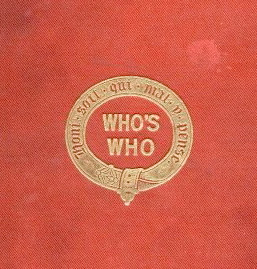These days most people either do not have enough imagination
or spare time or superabundant creativity to list recreations in their entries
for Who’s Who that stray far beyond walking, reading, tennis, or golf—if they
bother to list them at all. Others indulge that irritating habit of using their
entries as an opportunity to insert a tedious little joke. Naturally in both respects, as in all others, the Edwardians tease and delight us by going much further
in the same directions. In his “The Recreations of Distinguished people” (Temple
Bar, 127:507, February 1903, pp. 208–16), Charles I. Graham selected from the 1902 edition what he
then regarded as some of “the most interesting pieces of information afforded
by this most interesting book”:
Dr. T. L. Cuyler, for instance, states that “fifty-two years of active life in such perfect health have been his as to need no recreations”; yet, he adds, “except walking, and entertainment-reading, and talk”—a liberal exception after all. Mr. Nicholas D. Davis, auditor-general of British Guiana, tells us that “he knocks off work to carry bricks”…and that his peculiar form of recreation also consists in “historical researches relating to English colonization in America.” This is something like the answer given by William Montgomery Crook, editor of the Echo, who looks on “politics” as part of his recreation. It is indeed difficult to conceive how men’s recreations can, in any true sense, lie so close to their daily work. Of course, if a man has changed his calling as life goes on we can understand how his recreation may consist in resuming somewhat of his earlier tasks, as when Dr. J. B. Crozier, now philosopher and historian, tells us that his recreations are “skating, boxing, dog-fancying, swimming, walking, and attending the practice of the special hospitals.”…It is not always the really greatest who indulge in peculiar forms of recreation. Neither [Field Marshal] Lord Roberts [of Kandahar] nor [Lieutenant-General] Lord Kitchener [of Khartoum] is eccentric when at play. Lord Roberts simply states that he hunts and bicycles; Lord Kitchener apparently ignores the question. It does not need a reference to Who’s Who to inform us that the present prime minister’s recreation is golf [the Right Hon. Arthur Balfour, M.P.], nor that of the late prime minister (Lord Salisbury) natural science…But to come to some of the more extraordinary answers given to this question, What is your recreation? Surely a man must have no recreation proper who tells us, as Lieutenant-General J. W. Laurie, D.C.L. and M.P., does, that he finds it thus: “Member of Governing Body of City and Guilds Institutes; agriculture, breeder of thorough-bred stock, and personal supervision of an experimental farm; also of children settled in Canada from Mrs. Birt’s Home at Liverpool.” Side by side with which we may place, “maker and patentee of the Sleepy Hollow chair,” which the Dean of Ely (Dr. Stubbs) mentions as his form of recreation.
Graham continues at length in this vein, but I must say that
my favorites are the following, quoted in no particular order:
Mr. G. R. Sims: “Battledore and shuttlecock,”
pointedly not Badminton.
The Reverend E. J. Hardy, chaplain to H.M. Forces, “Riding
his horse ‘Baby,’ or her assistant, Curate, as he calls his bicycle; talking to
soldiers; taking a sunbath; thinking of the queer things of life; swimming,
golf.”
H.S.H. The Duke of Teck, brother of the Princess of Wales, the future Queen Mary:
“A little of all.”
Mr. Charles Williams, senior military correspondent of the
Daily Chronicle: “Ritual.”
Mrs. Crawford, Paris correspondent of the Daily News: “Moon-
and star-gazing when resting on oars in the country; was in youth devoted to
reading, chess-playing, and pictorial art; likes now a quiet rubber of whist;
hardly ever knows what tedium is; is a constantly interested observer of
animated nature; has found real life so interesting that novels and plays seem
flat; roughed it in the [Franco-Prussian] war of 1870, and during the Commune,
and feels thankful for the education thus acquired.”
William Hall, V.C., R.N., farmer of Nova Scotia: “Shooting crows.”
Sir Henry Irving, actor: “Acting.”
Lord Baden-Powell: “Pig-sticking (winner of
Kadir Cup), polo, big game shooting, hunting, yachting, stage-managing, acting,
and singing, painting, etching.”
The Countess of Galloway: “The musical drama
of Bayreuth at Bayreuth.”
The Most Reverend Richard Whately, Church of
Ireland Archbishop of Dublin: “The boomerang.”
Madame Janotha, court pianiste to H.I.M. the German Emperor:
“Visiting the chapel of our Blessed Lady at Czestochowa [her place of birth in Poland]. Playing the organ,
reading great works, mountaineering, taking care care of White Heather (the
black cat).”
George Chetwynd Griffith: “Loafing and
traveling; has been five times and a half round the world; once across the
Rockies, thrice over the Andes (treasures a pipe smoked at 19,300 feet above
sea-level), three times round the Horn, once in the Antarctic ice; has also
flown in a balloon from London to the field of Agincourt; at present wandering
through Australasia and Oceania to see how they look twenty years after.”
Emily Soldene, singer, actress, director,
theater manager, novelist, and journalist: “An ocean voyage, plain sewing, and
building castles in Spain.”
Dame Clara Butt, contralto: “Signing
autographs and photographs.”
The Reverend Canon William Benham: “Riding on
the knife-boards of omnibuses.”
Dr. Paul Mantegazza: “Je me suis marié
à 25 ans à Salta dans la République Argentine avec une jeune demoiselle de
haute famille et j’en ai eu cinq enfants, et une seconde fois à 60 ans avec une
jeune comtesse de Florence et j’en ai une petite fille qui a maintenant sept
ans.”
Colonel William Carey, C.B.: “Reconnoitering
country with a view to military maneuvers in peace and war; study of scripture
as literally carried out in the present day in its political aspects; deep sea
diving.”

No comments:
Post a Comment